
| Jacket 38 — Late 2009 | Jacket 38 Contents page | Jacket Homepage | Search Jacket |
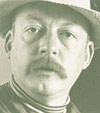
This piece is about 6 printed pages long.
It is copyright © Simon Cutts and Jacket magazine 2009. See our [»»] Copyright notice.
The Internet address of this page is http://jacketmagazine.com/38/jwa15-cutts-simon.shtml
Back to the Jonathan Williams Contents list
1
Jonathan Williams approached England as he approached everything : with an erudite and eclectic epicureanism. In the nineteen sixties he travelled the country from his base in Hampstead London in the company of Ronald Johnson in search of new innate qualities that would fit his vision of the place. It resulted in Ron’s Book of the Green Man and Jonathan’s The Lucidities 1967, among many other things.
2
Later, settling with Thomas Meyer at Corn Close in Dentdale, Cumbria, just west of the Pennines, he extended his fascination for what he came to see as a peculiar place. It remains enigmatic to many of us, even if we come from it. Where he chose to live is littered with footnotes from Bunting’s Briggflatts, names and places on a journey across the north of England, from the Quaker Meeting House itself, near to Corn Close, through Teesdale to darkest Tyneside.

3
For myself this territory is somewhat bound-up with a circumspect view of the North, well beyond my parts in lowland Derbyshire. Erica and I once walked from my father’s house there in Belper to Jonathan’s in Dentdale, along the Pennine Way and then branched off towards Dent, over about ten days. It was a way of locating his open moorland while at the same time escaping the industrialised, over-populated and built-up Midlands.
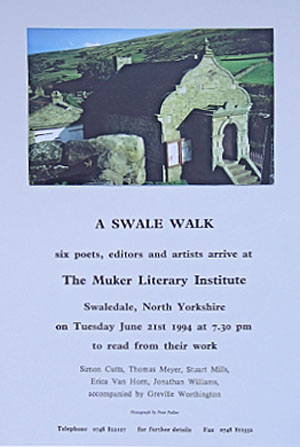
4
Jonathan was always looking for great pub food, but was often disappointed. Armed with The Good Beer Guide, The Good Pub Guide, and on occasion even The Good Food Guide, he thought he might find the true vernacular of English cooking. Instead, he was once served the blackened kidneys of a mixed grill at the High Force Hotel in Upper Teesdale in 1977, only to be drawn in charcoal by Ian Gardner for a retaliatory postcard. The Sun Inn in Dent was his local, but only for drinking. It was here that they thought Jonathan must be Canadian because he was such a nice chap! It was at times all very tweedy. He called himself The Squire and often dressed appropriately.
5
Tom would often cook in the vernacular of the American South. They had published White Trash Cookery, and it was with a recipe from that book that they came first in The Independent newspaper’s cookery competition one year. Rack of Spam won them a bottle of extra virgin Tuscan olive oil.
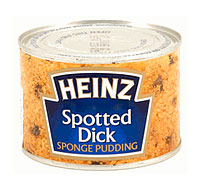
6
Jonathan often remarked on the names of the owners of the Sharrow Bay Hotel and Restaurant at Windemere in the Lake District. Francis Coulson and Brian Sack were a rather Pythonesque couple, who, they claimed, had invented Sticky Toffee Pudding. Jonathan revelled in the names of all the odd dinners and puddings of English cooking: Dead Baby, Babies Head, Spotted Dick, Blue Vinny, Wet Nelly, Sussex Pond Pudding, Toad in the Hole, names he delighted in and celebrated in Super-Duper Zuppa Inglese ( and Other Trifles from the Land of Stodge ) In these interests, there is more than a nod to Jane and Geoffrey Grigson, and their attempt to locate a certain Englishness.
7
..........................................................................................................
He thought the beer from Faversham, Kent was called Shepherd’s Knee, when in fact it was Shepherd’s Neame, after the family who made it.
8
...........................................................................................................
He delighted in the composer Frederick Delius, the composer being born in Bradford, and that his brother still had a garage there.
9
............................................................................................................
I once took all the bones out of a trout for him at the Tate Gallery Restaurant
10
............................................................................................................
We both thought later on that John Livingstone Learmonth’s Wines of the Northern Rhone was a kind of bible.
............................................................................................................
11
I remember Jonathan first of all as the reluctant compere of Poetry 66 in Nottingham,
hearing in advance of his legendary epicurean tastes, his ‘wants’ list, which as a young poet, I could never match or provide. Years later in Norfolk, when he asked for 100 oysters and the best Sancerre, I could.
.........................................................................................................
12
Jonathan was one of the few Americans who could grasp the game of cricket. We were both great admirers of John Arlott, legendary commentator of the game, but also poet, policeman, expert and writer on beaujolais ( I like to drink beaujolais with my beaujolais, he once said ). His drôle, laconic voice, with perfect pace and pitch, still echoes down the years. I think I read that he died falling down the steps of his cellar.
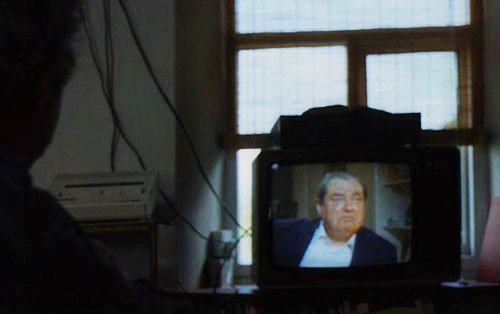
Watching John Arlott on television, around 1991
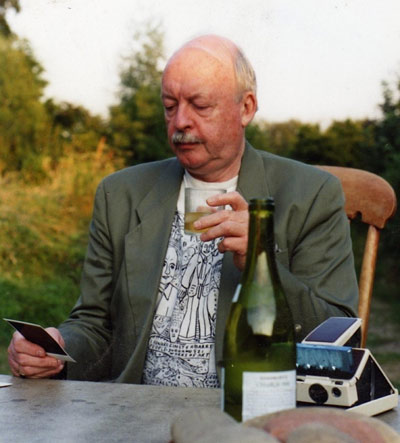
JW in Norfolk, England, Summer 1993, warming a polaroid from his trusted SX70 Land Camera, whilst ice-cubes melt in his glass.
13
My last visit to see him was to his Skywinding Farm, Scaly Mountain, North Carolina – Corn Close in a parallel universe, the way it is perched above the road and the turn up to it. We went to talk of his archive of photographs taken over the years. We brought with us, among other things, an astounding Gruner Veltliner – exactly his kind of wine, and with more than a touch of Bruckner about it. He only moved from his chair with great difficulty. The Weather Channel was still on as it had been during my last visit, and the video-loop of the fire was still burning in the hearth.
In May 2008 we made a last visit to Corn Close. It was strange to be there without him, and more than a little bleak, but it was such a beautiful day that the valley across the Dee was singing, a score propped-up in front of us. I did a rubbing of Jonathan’s cigar-cutter left there on the desk, almost the ghost of itself, open and with the blade receded, as if he were just about to take the closed end off the day’s cigar.
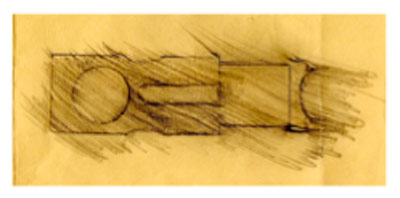
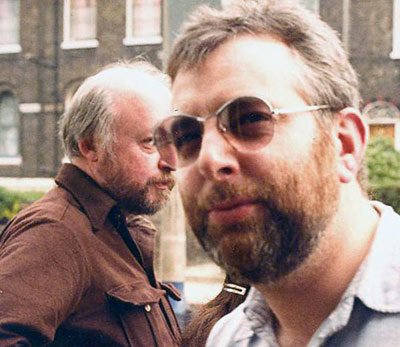
Jonathan Williams, Simon Cutts
Simon Cutts is a poet, artist, and editor, who has developed Coracle Press over the last thirty years in its many publicational forms. His own concern is with the book and its mechanisms as a manifestation of the poem itself. He lives in Ireland with Erica Van Horn.